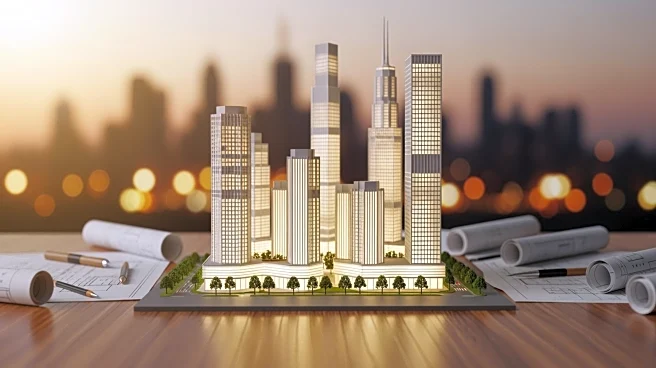What's Happening?
The Detroit Downtown Development Authority (DDA) has approved a $75 million reimbursement to support the redevelopment of the Renaissance Center, a project spearheaded by Dan Gilbert and General Motors.
This initiative is part of a larger $1.6 billion plan aimed at transforming the area into a family-friendly entertainment destination that connects the Ren Cen with the riverfront. The redevelopment includes demolishing two towers to enhance public access and amenities, converting the Marriott Hotel into a mix of hotel rooms and apartments, and transforming office spaces into residential units. The project seeks to revitalize the riverfront, making it more accessible and attractive to tourists, similar to Chicago's Navy Pier.
Why It's Important?
The redevelopment of the Renaissance Center is significant as it promises to revitalize a key area in Detroit, potentially boosting tourism and local economy. By enhancing public access to the riverfront, the project aims to create a vibrant civic space that could attract visitors and residents alike. The initiative also reflects a broader trend of urban renewal, where cities are investing in infrastructure to improve livability and economic prospects. The involvement of major stakeholders like General Motors and Dan Gilbert underscores the importance of corporate investment in urban development, which can lead to job creation and increased economic activity.
What's Next?
The next steps involve securing additional funding through the Transformational Brownfield Program, which requires state legislative approval to increase the fund's cap. State Rep. Alabas Farhat has introduced legislation to facilitate this process. The DDA's approval is contingent on the reimbursement being awarded only for completed demolition and construction work. General Motors plans to relocate its global headquarters from the Ren Cen to Bedrock's new Hudson's Detroit building in January, marking a significant shift in the company's presence in the area.
Beyond the Headlines
The redevelopment project raises questions about urban planning and public accessibility. Historically, the Ren Cen's design limited public access, and the new plan aims to rectify this by opening up the space to the waterfront and downtown. This shift reflects a growing emphasis on creating inclusive urban environments that prioritize pedestrian access and community engagement. The project also highlights the role of public-private partnerships in driving urban transformation, as well as the potential for such initiatives to reshape city landscapes and improve quality of life.









